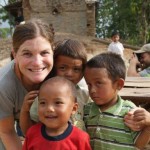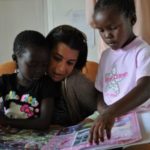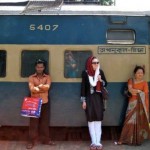Searching for Justice in Chittagong
I quietly drift down the street. I am solemn, graceful… I float past rickshaws. I am carried along with the current of Chittagonians. I wear a loose hijab and shalwar kamiz and I’m hoping that Bangladeshis assume I am Afghani before American. This trick will divert eyes and the questions: “why would a Westerner choose to move to Bangladesh”?
I arrived in this foreign country and was excited to view a new culture. I was ready to teach and meet young, aspiring female leaders. My relatives’ warnings overshadowed this excitement: they told me about developing countries’ blatant disregard for human life. These stereotypes made me angry. I, idealistic, was unprepared to judge. Who was I to judge?
The pursuit of social justice has always been important to me. I have tried to “keep an open mind,” “be brave,” “independent” and “try new things.” When I began to see the bad parts of Bangladesh, I realized that they were the same ones that I saw at home. There were many more similarities than differences.
In my country, I was disillusioned by the governmentally upheld social inequalities for drug addicts, certain “races,” genders, the sick, the elderly, or any “group of people,” as though we are all so separate.
At first, I scolded myself when I began to judge certain practices in this foreign country. I am naive, I thought. I do not understand the culture. Rather, I should stop judging, sit back, and observe my surroundings with an open mind. Inevitably, I thought, the truth would come–that this societal system is intricate and therefore reasonable.
Searching for Justice in Chittagong.
I live in a posh, “for-foreigners-only” apartment. Right down the street is the NGO where I work, interviewing women with stories that closely resemble 18-year-old “Rina’s”: At age 12, Rina became a burden to her family so her mother asked that her uncle find her work as a maid. Rina was unhappy to leave home. However, she understood that she was old enough to pay her own way. Rina’s uncle took her into the city and sold her to a lady pimp (dalal). Rina did not know what sex was but she was extremely scared of this woman. The lady pimp drugged her and allowed five men to rape her in a row. After this, Rina felt like she was “spoiled.” She could not return to her family because her mother would accuse her of choosing the life of prostitution against her family’s consent. This is the story of a poor woman in Bangladesh. Not all stories are so horrific, but too many are.
If Rina lived another life in a poor family, she may have been forced to work in a garment factory where male managers threatened or sexually harassed her all day. She may have been a woman whose eye was dug out when she was younger and had been sewn shut. Or, she might have been an orphan child who was missing an arm or an elderly man whose eyes are glazed over due to cataracts–alone, dehydrated, a thin matrix of bones, skin, and white hairs.
There are some things that cultural relativism will never justify. When I go home in May, I will wonder why one of the richest countries in the world, one that holds close to the highest standards of living, will have addicts on the street. I will wonder why these marginalized people also live outside of Los Angeles and New York City, addicted to heroin, crack, selling their bodies for drugs, passing on HIV with needles and sex for money.
While other residents sit in their penthouses in Beverley Hills or Manhattan, I see something new.
While other residents sit in their penthouses in Beverley Hills or Manhattan, I see something new. This inequality is the same everywhere, and no matter what we tell ourselves, it is our own faults. This is how we know that something in our society has gone very wrong. Who are the keepers of social justice and where do they live? There are many of us thinking about these problems, but certainly not enough.
Photo by Jessi Hinz.








